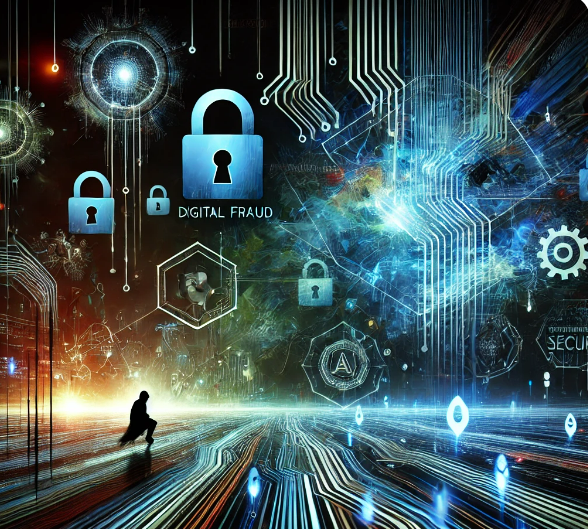Digital Fraud: The Silent Engine of Chaos in a Predictable World
DIGITAL SECURITY
9/26/20246 min read


Future of Technology Desk


We live in a world of engineered predictability. Algorithms power our news feeds, recommend our next Netflix show, and anticipate what we’ll buy next. In this landscape of controlled experiences, digital fraud is the silent disruptor—injecting chaos into a system that thrives on precision and trust. But here’s the twist: fraud isn't just the enemy of this new digital order. It's also an accelerant, driving technological innovation, reshaping governance, and, in unexpected ways, enhancing resilience in the systems it threatens to destroy.
In this sense, digital fraud is no longer just a crime; it is a force—both destructive and transformative. To understand its true impact, we need to stop thinking of fraud as just a disruption to businesses or individuals. Instead, we must recognize it as a paradoxical agent of change in an era obsessed with control.
Chaos as a Design Feature: Why Fraud Forces Innovation
Think about it: every major technological innovation in security—from firewalls to biometric verification—was driven by the need to combat fraud. Without fraud, these innovations would have evolved at a slower pace or may not have evolved at all. Digital fraud, by its very nature, exposes the weaknesses in our digital architectures. In doing so, it forces us to innovate, creating stronger, smarter, and more resilient systems.
Take the rapid adoption of AI in fraud detection. As fraudsters have grown more sophisticated, leveraging everything from deepfakes to social engineering, companies, and governments have been forced to turn to advanced AI algorithms that can analyze vast amounts of data in real time to detect anomalies. This shift toward predictive security wasn’t born out of a proactive vision—it was a necessary reaction to the relentless chaos fraudsters bring to the digital realm.
In this sense, fraud operates as a hidden R&D department for cybersecurity. It forces us to be faster, smarter, and more adaptable. Without it, we’d likely still be relying on outdated security measures, leaving our digital environments vulnerable to even more catastrophic breaches.
The Chaos Dividend: How Fraud Fuels Systemic Evolution
While digital fraud is undeniably damaging, it’s also a driving force behind systemic evolution. Every time a system is attacked and successfully defends itself, it grows stronger. In biology, this is called “antifragility”—systems that don’t just resist stress but improve because of it. The same principle applies to digital fraud and cybersecurity. Each attack exposes vulnerabilities, but each recovery makes the system more robust.
For instance, the financial sector has evolved rapidly in response to digital fraud. When community banks and credit unions in the U.S. faced $10 billion in fraud losses in 2023, the response was not just to tighten security but to rethink how transactions and accounts are monitored. Real-time fraud detection systems, which were once a luxury, are now becoming the norm. Identity verification technologies, like biometrics and AI-based fraud detection, are now central to banking, reshaping how financial institutions operate globally.
In short, fraud is not simply something to be combated; it's a chaotic force that compels systems to evolve in ways they otherwise wouldn’t. Without these constant stress tests, our digital infrastructure would stagnate, remaining static and increasingly vulnerable to eventual collapse.
Digital Fraud as a Global Game of Adaptation
While traditional narratives frame fraud as a parasitic element feeding on weaknesses, the truth is more complex. Fraudsters themselves are engaged in a game of adaptation. As systems evolve to counter them, they evolve in turn. It’s a constant tug of war, and this dynamic has far-reaching consequences. We’ve reached a point where digital fraud is no longer confined to email scams or bank account phishing; it's becoming intertwined with geopolitical strategy and national security.
Consider the rise of state-sponsored cybercrime. Countries are weaponizing fraud not only to disrupt economies but to destabilize governments and influence elections. This isn’t just about financial gain—it’s about leveraging digital fraud as a tool for political manipulation and control. In this sense, fraud is not just a byproduct of criminal activity; it’s a deliberate strategy for achieving broader, often hidden, goals.
Take the example of advanced financial fraud systems targeting developing nations. Fraud in these countries is not just about exploiting weak infrastructures—it’s about shaping economic policies and influencing government decisions through targeted disruptions. When digital fraudsters siphon billions from a country’s economy, the aftershocks ripple through national policies, often forcing governments to adopt emergency measures, which can then be exploited politically.
PIC: ChatGPT
PIC:Canva
Who We Are:
The Economic Nations champions global unity through economic collaboration, focusing on sustainable growth, reducing inequalities, and enhancing global relationships for mutual prosperity and peace.
______________________________________
Trust as a Commodity: The Real Currency of the Digital Age
Here’s a radical thought: what if digital fraud wasn’t simply a crime against trust, but rather a way of recalibrating it? Trust in the digital world is fluid—it’s constantly being tested, renegotiated, and rebuilt. And fraud plays a crucial role in this recalibration.
In a sense, fraud exposes the cracks in the fragile systems of trust we rely on. Each time a high-profile breach occurs—whether it’s a phishing scam that targets millions, or a case like Indian business tycoon S.P. Oswal’s where fake Supreme Court hearings were used to steal millions—we’re reminded of the precariousness of digital trust. But rather than destroying trust altogether, these events force institutions and individuals to rethink how trust is built and maintained.
Fraud, then, becomes the stress test for trust. It’s what forces companies to be transparent, governments to be accountable, and individuals to be cautious. That’s why digital identity verification has become such a booming industry. In a world where fraud is a constant threat, trust is no longer something that’s taken for granted—it’s a commodity that must be earned and maintained through continuous improvement.
The Fraud Ecosystem: A Catalyst for New Economies
The rise of digital fraud has also created its ecosystem—one that’s paradoxically driving economic growth. Think about it: entire industries now exist solely to combat fraud. From cybersecurity firms and AI developers to legal experts and insurance companies, the economy surrounding fraud prevention is booming.
Consider the insurance industry. As digital fraud grows, so does the demand for cybersecurity insurance. Businesses are now insuring themselves not just against physical threats but against potential digital fraud attacks. This shift is creating new economic models, where the prevention of fraud becomes a service that companies provide at scale. The fraud economy is real, and it’s reshaping how businesses think about risk and protection.
The existence of fraud as a persistent threat is reshaping entire industries. Companies are now designing products and services with built-in fraud prevention measures, turning security into a selling point rather than an afterthought. This is the fraud-driven economy—a place where security is not just a necessity but a marketable feature, and where digital fraud indirectly fosters innovation, drives new business models, and creates value in unexpected places.
Conclusion: Embracing the Chaos of Digital Fraud
To truly understand digital fraud, we need to stop seeing it as a mere criminal act and start recognizing it as a force of chaos that reshapes everything it touches. Yes, it’s destructive, but it also drives innovation, recalibrates trust, and fosters resilience. In an increasingly predictable, algorithm-driven world, fraud injects unpredictability—forcing systems, institutions, and individuals to adapt in real-time.
Digital fraud is a battle, but it’s not one we can afford to lose—or even to win outright. The truth is, as long as fraud exists, it will continue to push us to create stronger, smarter, and more adaptive systems. And in that sense, it’s not just a crime—it’s a catalyst for progress.
In a world that’s obsessed with control, digital fraud reminds us that chaos, in its way, is essential for growth.
Cautionary Note:
This article is not meant to glamourize or downplay the serious impact of digital fraud. Instead, it serves as a reminder that, while we may not fully eliminate fraud, we can channel its challenges into driving innovation, resilience, and stronger security systems for the digital world.
Contacts
enquiry@economicnations.org
(xx) 98-11-937-xxx (On verification)
